
'Cash is literally useless' - Dollars and pounds attacked at crypto conference as inflation spikes
It's a dramatic sight.
At the heart of a bustling conference hall, steam billows from a replica volcano emblazoned with Bitcoin 2022's logo.
For attendees, it's a symbol of the cryptocurrency's future ambitions - and shows how far Bitcoin has come since it launched in 2009.
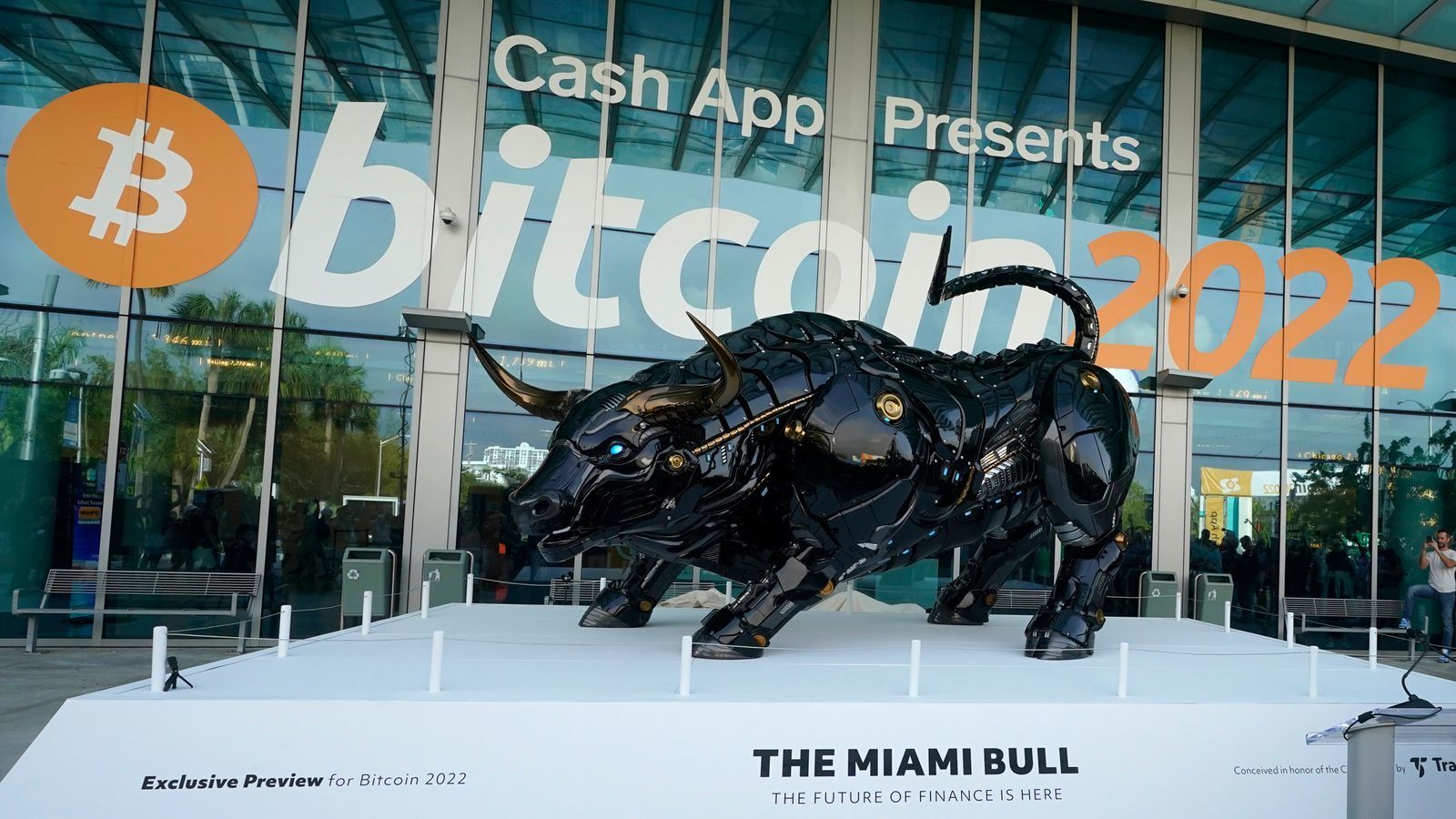 A 3,000lb statue of a bull was unveiled on the first day of the conference.
A 3,000lb statue of a bull was unveiled on the first day of the conference.
Early conferences only attracted dozens of people, mainly cryptographers.
Bitcoin 2022 is different. Organisers say more than 25,000 people turned up each day - with thousands more watching online.
This doesn't feel like an exaggeration. The Miami Beach Convention Centre is cavernous - it takes 20 minutes to walk from one side to another.
Ten years ago, whole Bitcoins were given away for free… and some even went unclaimed.
But this week, enthusiasts were battling it out for the chance to win crypto. Queues formed at a mechanical bull - and the competitor who stayed on the longest would be rewarded with 1 BTC.
That's about £33,000 at the time of writing. In case you're wondering: yes, I did go on it. And yes, I lasted two-and-a-half seconds. (The winner held on for two-and-a-half minutes.)
 Riding the mechanical bull was even harder than it looks... and it looked difficult
Riding the mechanical bull was even harder than it looks... and it looked difficult
Bitcoin's a teenager now
It's estimated that 150 million people worldwide now own Bitcoin - and the cryptocurrency's supporters argue that this digital asset is maturing fast.
An American senator was among the speakers on the main stage, which was named after Bitcoin's pseudonymous inventor Satoshi Nakamoto.
Serena Williams also proclaimed her love for Bitcoin, with the tennis champion investing in a multitude of crypto startups.
 Tennis star Serena Williams thinks Bitcoin is ace - and spoke at the conference
Tennis star Serena Williams thinks Bitcoin is ace - and spoke at the conference
Prior to the event, there was palpable excitement over what would be announced at Bitcoin 2022.
At last year's conference, El Salvador surprised attendees - and the world - by announcing that it planned to adopt Bitcoin as legal tender, elevating it to the same status as the US dollar.
President Nayib Bukele's policy went into force three months later… and this speed caused problems of its own. There were anti-Bitcoin protests on the streets, huge technical hiccups as Salvadorans attempted to claim the free $30 in BTC they were entitled to, and warnings from the International Monetary Fund that this was a very bad idea. (A recent poll by the country's Chamber of Commerce also revealed that 91% of businesses said the Bitcoin Law had no material impact on their sales.)
Indeed, the volcano in the conference hall is a tribute to El Salvador. Mr Bukele recently announced plans to create "Bitcoin City" - a metropolis devoted to the cryptocurrency that would be built at the base of a volcano. The president was meant to deliver a keynote speech at this year's event, but had to cancel due to "unforeseen circumstances". His country recently declared a state of emergency after a spike in gang-related killings.
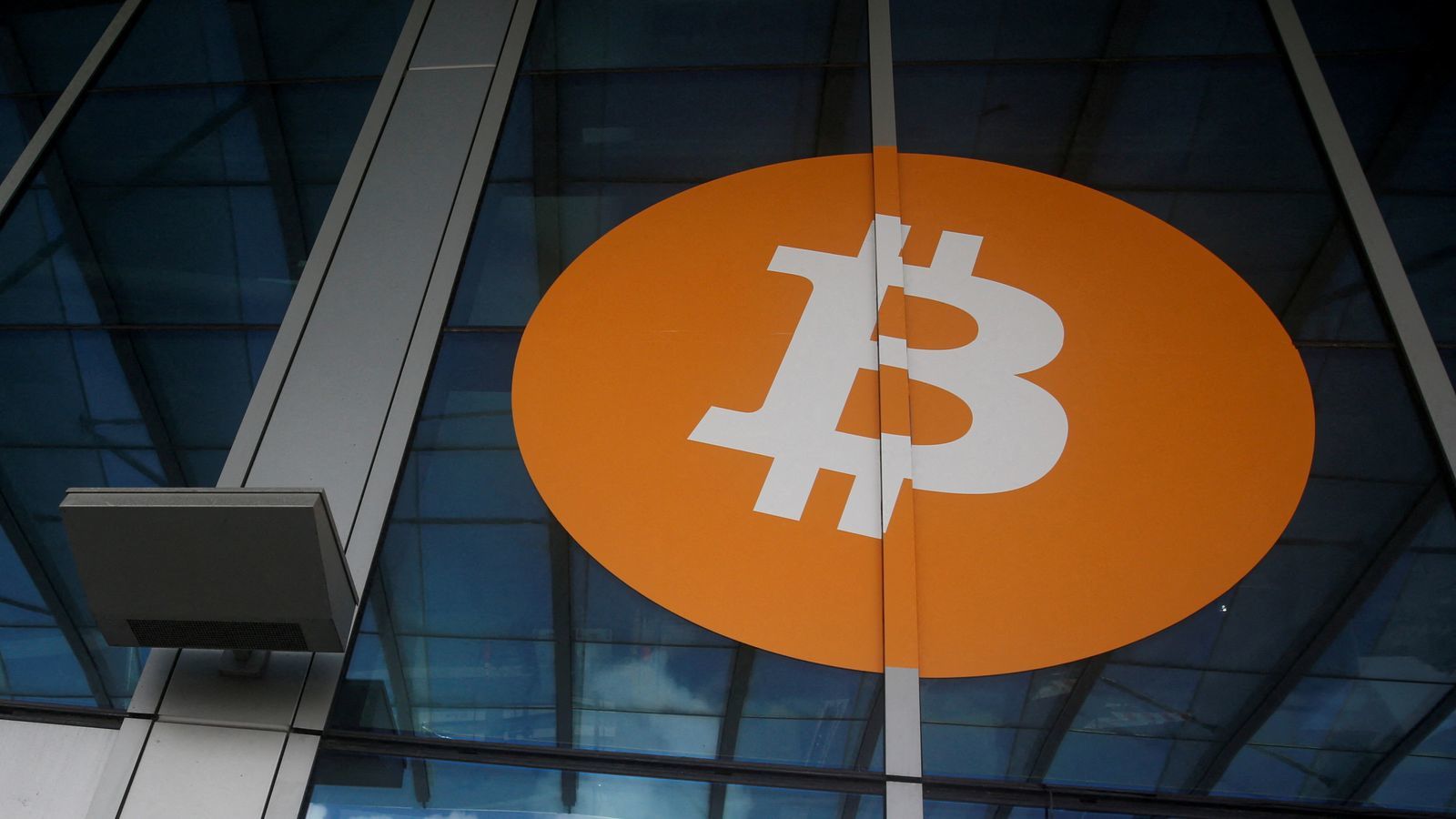 An estimated 25,000 people attended each day of Bitcoin 2022's main conference
An estimated 25,000 people attended each day of Bitcoin 2022's main conference
Bitcoin 2022 announcements
When it came to this year's announcements, the rumour mill was in overdrive. Would Apple embrace crypto? Would another country embrace Bitcoin as legal tender?
The answer to both questions was no. Instead, the focus was on making BTC more practical as an everyday payment method.
Right now, the Bitcoin network can take anywhere from 10 minutes to an hour to confirm a transaction. The average fee comes in at £1.44. And while Visa can handle about 1,700 transactions per second, Bitcoin's blockchain can only process seven.
The main announcements centred on technology known as Lightning. It promises to make Bitcoin payments instantaneous, complete with "exceptionally low fees". Crucially, it's claimed that this network can scale to millions or billions of transactions per second if necessary. A string of companies - including Cash App and Robinhood - unveiled support for Lightning at the conference.
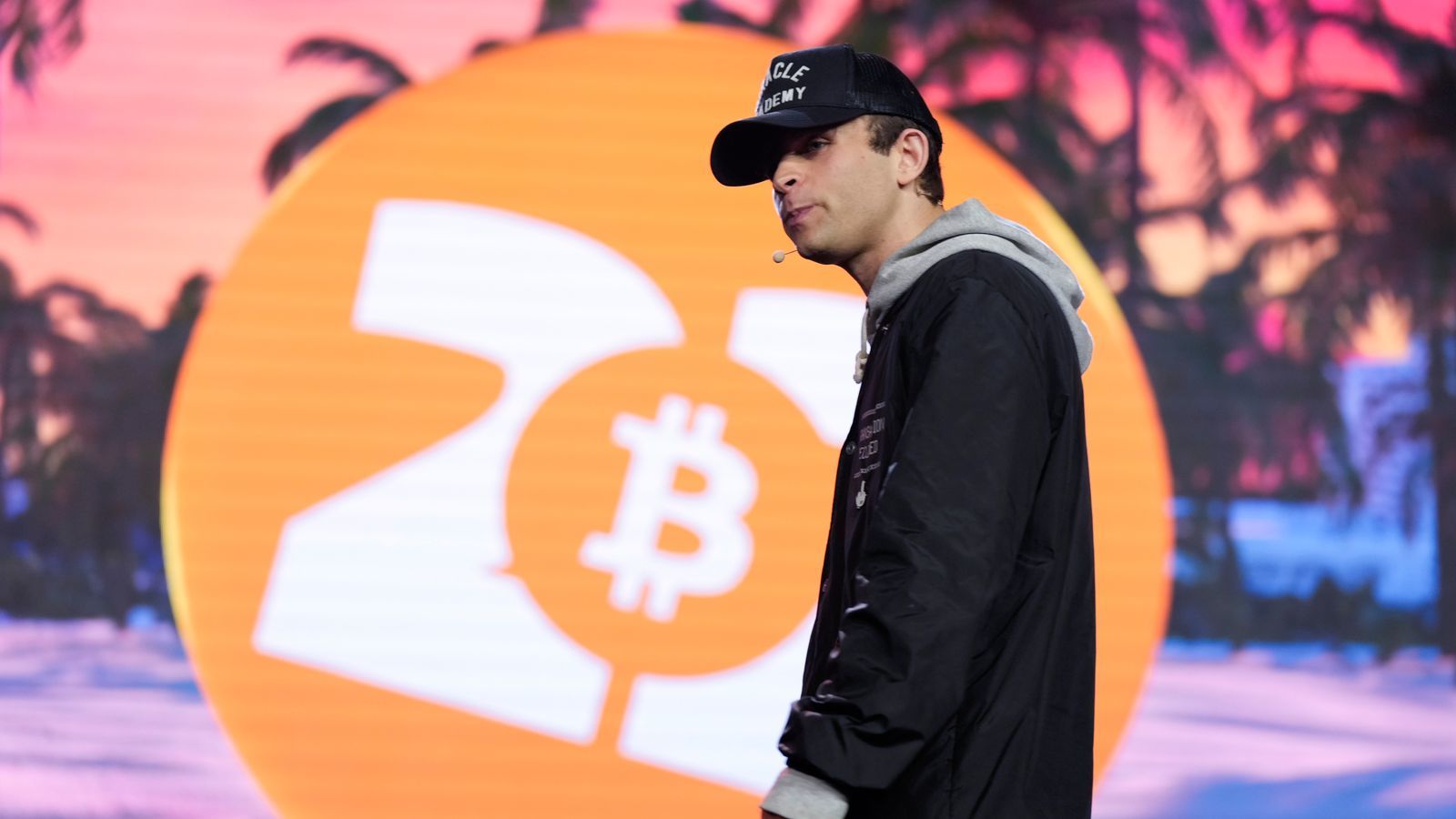 Strike CEO Jack Mallers accused the likes of Visa and Mastercard for failing to innovate over the past 50 years.
Strike CEO Jack Mallers accused the likes of Visa and Mastercard for failing to innovate over the past 50 years.
Jack Mallers, the CEO of the crypto company Strike, also revealed he was building a cheap, Bitcoin-based payments network designed to rival credit card giants. Through a number of partnerships, including with the world's biggest supplier of point-of-sale devices, he vowed to ensure Bitcoin can be used as a payment method in "millions" of American stores - including McDonald's, Walmart, Whole Foods and Starbucks.
The entrepreneur accused legacy payment networks - including Visa and Mastercard - of failing to innovate for more than 50 years. Both of these brands have been embracing cryptocurrency over the past year or two. Mastercard's head of crypto, Raj Dhamodharan, pushed back against these claims - telling me that the company is "constantly adding value".
While Strike's announcement was a big deal for the US, you could argue that international attendees didn't get that "rabbit out of the hat" moment.
The city of Prospera in Honduras - and Madeira in Portugal - did reveal that they're planning to adopt Bitcoin. But Samson Mow, an entrepreneur who is devoting his time to helping nation-states embrace this cryptocurrency, told me on CoinMarketCap's podcast that it's "difficult" for most countries to take the plunge like El Salvador did because their presidents and prime ministers lack influence. (President Nayib Bukele once described himself as "the coolest dictator in the world".)
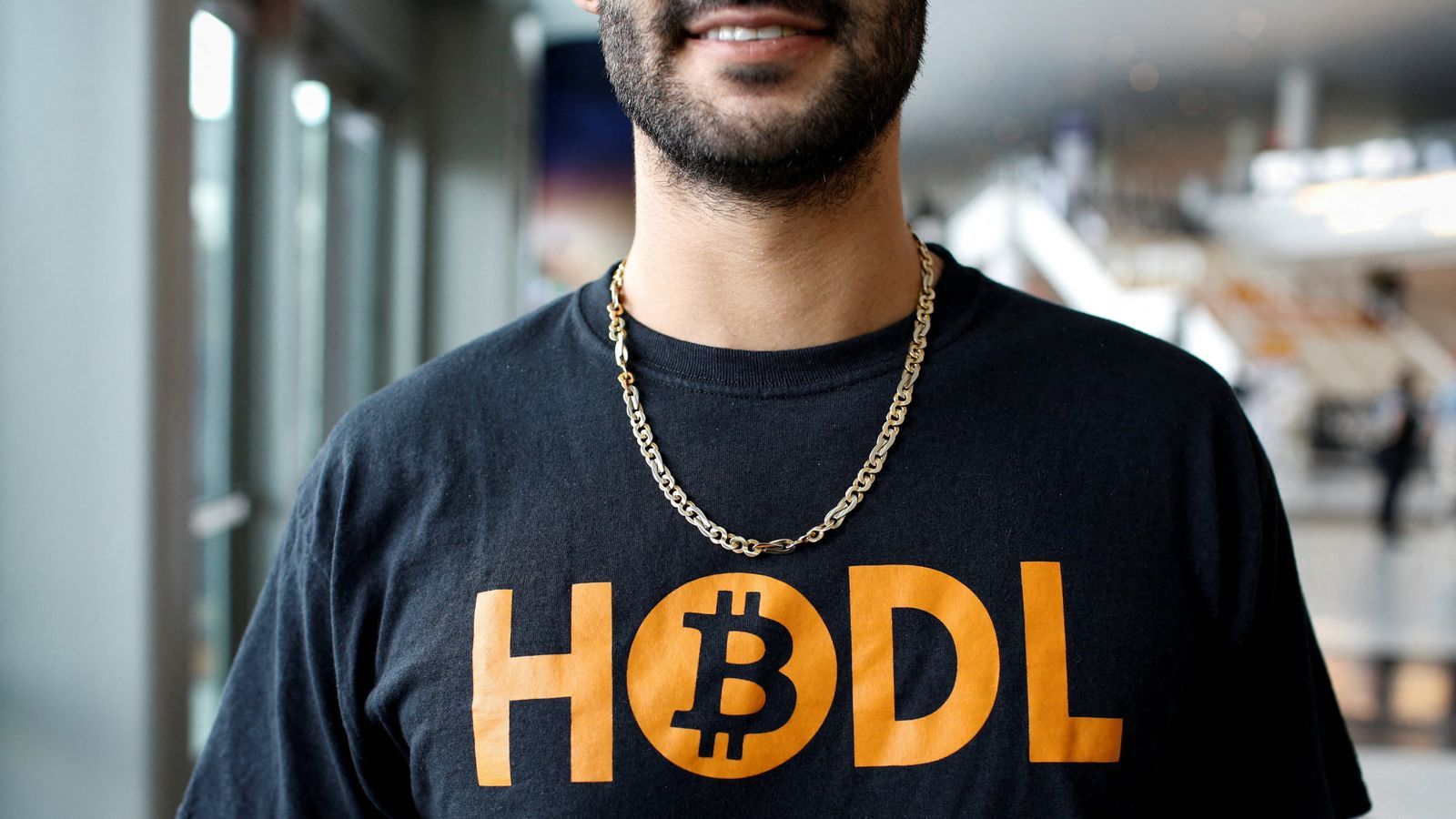 A Bitcoiner wears a
T-shirt that says 'HODL' - encouraging people to hold on to their
crypto. The slogan's inspired by a typo made on a Bitcoin forum years
ago
A Bitcoiner wears a
T-shirt that says 'HODL' - encouraging people to hold on to their
crypto. The slogan's inspired by a typo made on a Bitcoin forum years
ago
Cash 'is literally useless'
At times, the speakers on stage at Bitcoin 2022 did sound a little cultish - with some downright scaring people by claiming major currencies like the US dollar will implode in a matter of years.
Mexican billionaire Ricardo Salinas brandished a banknote and said: "This thing is literally useless... it's not even good for toilet paper."
Bitcoin has a fixed supply of 21 million coins, and because of this, its supporters firmly believe that the cryptocurrency protects investors against inflation. Many in the industry have been fiercely critical of central banks for increasing the amount of money in circulation, and warn that consumers are only going to see their spending power erode further in years to come.
There was also fierce criticism of central bank digital currencies (CBDCs) - with the Bank of England and the US Federal Reserve weighing up plans to build digital pounds and dollars respectively. Bitcoiners hate these proposals, and claim they have the potential to be even worse than cash. Mr Salinas suggested CBDCs could give banks unprecedented control - and even stop people from buying cigars or staying out past 2am.
"They think it's a bad idea? They close your capacity to spend your money. They'll be tracking 100% of your spending - what you spent, and how you spent it," he warned.
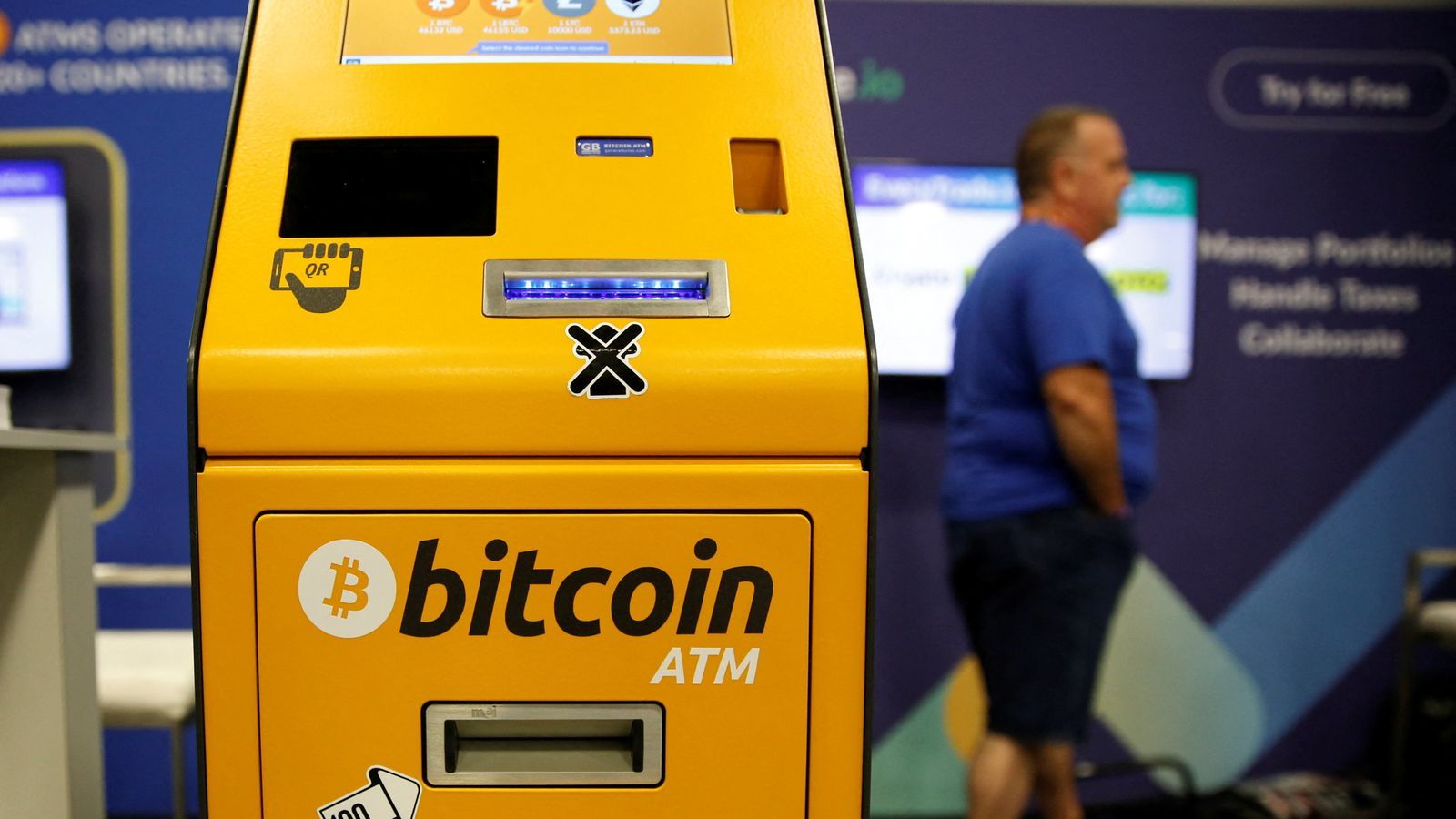 Bitcoin ATMs allow users
to convert physical cash into crypto - but they recently disappeared in
the UK over fears they could facilitate money laundering
Bitcoin ATMs allow users
to convert physical cash into crypto - but they recently disappeared in
the UK over fears they could facilitate money laundering
Talk on stage also regularly turned to "orange pilling" - the term that's used to describe encouraging people to invest in Bitcoin for the first time. Although such talk is perfectly normal in the (rather macho) world of crypto, it might be extremely off-putting to everyday consumers.
Bitcoin has faced a barrage of criticism from the likes of Bill Gates and Warren Buffett, with the latter famously describing it as "rat poison squared". But speakers passionately argued that these men come from a position of financial privilege - and live in advanced economies with free speech and relatively stable countries.
One panel led by the Human Rights Foundation claimed Bitcoin is viewed differently in nations ravaged by war, weak currencies, hyperinflation or authoritarian regimes. Indeed, the US Senate recently heard evidence from one Ukrainian refugee who said they preferred to receive Bitcoin over international cash transfers because it could be used immediately.
 Bitcoin miners pushed back against criticism over how much energy the cryptocurrency's blockchain uses
Bitcoin miners pushed back against criticism over how much energy the cryptocurrency's blockchain uses
Bitcoin's climate impact
The Bitcoin blockchain's energy usage is regularly cited as a cause for concern - and rightly so. The process of verifying transactions and minting new coins, known as mining, gobbles up a lot of computing power.
But many of the speakers at this conference were dismissive of the network's carbon footprint, with some advocating for Bitcoin to use even more energy. In their eyes, the electricity that's used to power the thousands of machines that keep this network going is essential because of the benefits that the blockchain delivers. They question estimates that suggest Bitcoin has a bigger carbon footprint than a small country, and say previous forecasts about its future energy use have been well off the mark.
The CEO of the Bitcoin mining company Core Scientific, Darin Feinstein, pointed to an article written by the World Economic Forum in 2017 predicting that - by 2020 - "Bitcoin mining could be consuming the same amount of electricity every year as is currently used by the entire world".
He said: "We know they were wrong, the lights are still on."
Mr Feinstein went on to claim Bitcoin's energy use is "inconsequential" and is a "fraction of a fraction of a percent" of what the world consumes.
A bold claim for sure - but a word of caution: getting accurate data on this is far easier said than done.
Many Bitcoin miners also claim that they are intensive users of green energy - and they're actually helping drive innovation in renewables. The Bitcoin Mining Council, which aims to deliver "transparency" in energy use, estimates that 58.5% of the electricity used by miners worldwide came from sustainable sources in the fourth quarter of 2021. But just 46% of the global Bitcoin network are members of this council, meaning there's a lot of extrapolation going on here.
 Supporters say Bitcoin is
built on strong foundations - critics warn the cryptocurrency is a Jenga
tower that could collapse at any moment
Supporters say Bitcoin is
built on strong foundations - critics warn the cryptocurrency is a Jenga
tower that could collapse at any moment
Challenges ahead
London and Washington have both softened their tone on cryptocurrencies lately. While Chancellor Rishi Sunak wants to make the UK "a global cryptoasset hub", US President Joe Biden has signed an executive order calling on his government to examine the risks and benefits of digital assets.
This doesn't mean Bitcoin is out of the woods. Huge question marks remain over its energy use. And while many transactions can be traced on the blockchain, there are fears BTC can be used anonymously for money laundering, sanctions evasion and the financing of terrorism. The full force of regulation is yet to be felt - and while Bitcoin is unlikely to be banned altogether, tough rules could make it very difficult for people to own... and hard for crypto businesses to operate.
As of the time of writing, the total value of all Bitcoin in circulation stands at about £614bn. Despite the fact that it's still a minnow on the world's financial scene, its supporters are adamant that big things lie ahead.
One crypto CEO, Fred Thiel, said during the conference: "Bitcoin is going to evolve into something much bigger than I think most of us have envisioned. Its adoption is going to creep into every aspect of trade, every aspect of commerce, finance, saving, investing."
Given Bitcoin's current size, this almost feels like declaring a nine-year-old footballer will one day become the world's best striker. Sure, there's some promise... but isn't it too early to tell?
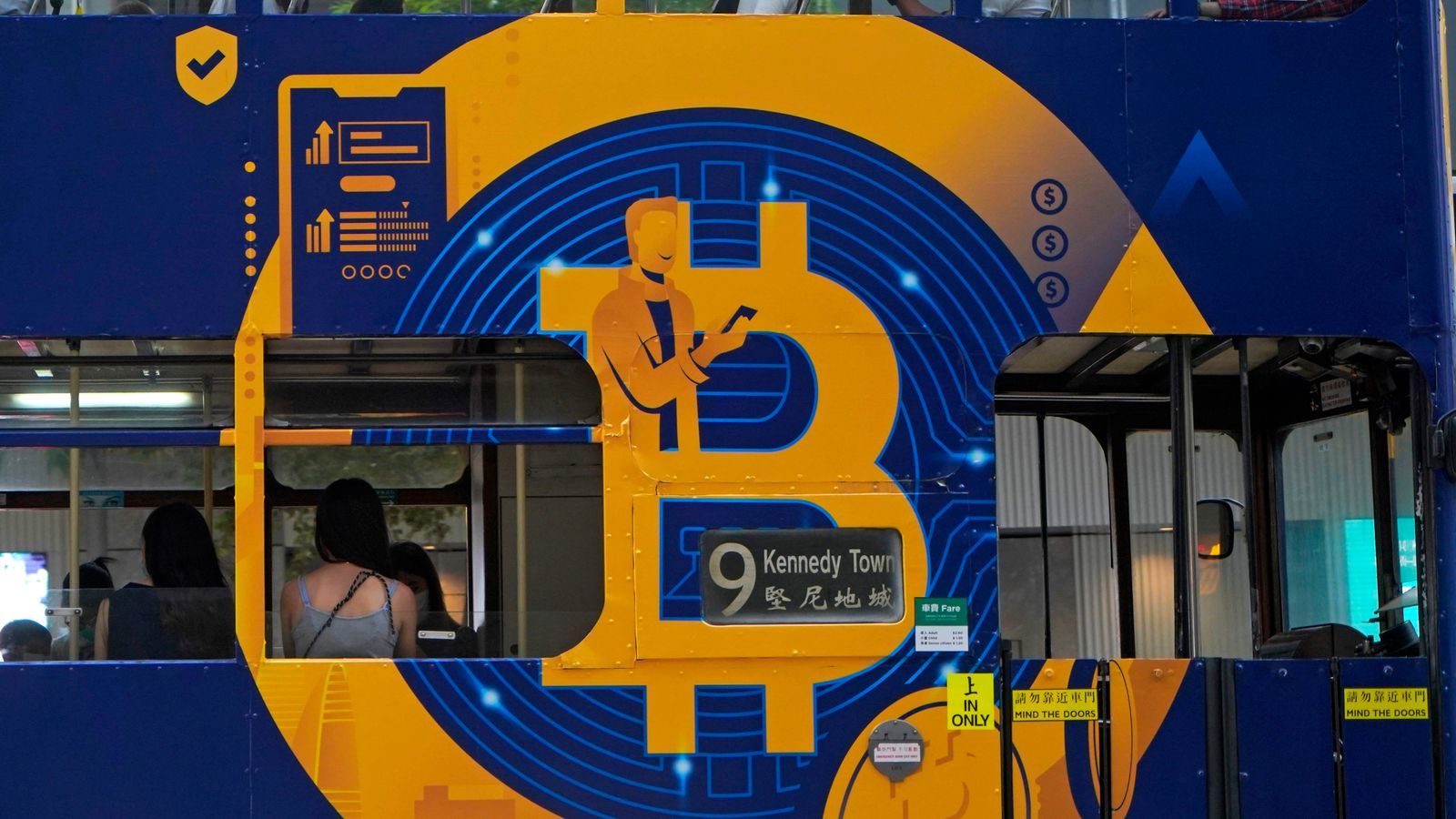 Bitcoin ads appear to be everywhere these days - especially in Miami.
Bitcoin ads appear to be everywhere these days - especially in Miami.
With 150 million users out of a population of eight billion, Bitcoin has a long way to go if it wants to achieve global adoption. Buying this cryptocurrency remains a fiddly, convoluted process for those who aren't technically minded, but it is getting easier. There are also worries about BTC's volatility, scams, and the prospect that it can be stolen - with no customer service number to call.
But those in the Bitcoin world are aware of all these challenges - and say they're determined to tackle them. The cryptocurrency's demise has been predicted hundreds of times over the years, and it has a reputation for proving naysayers wrong. Banks who once poured scorn on Bitcoin now predict it could be worth hundreds of thousands of dollars one day.
If this year's conference is anything to go by, Bitcoin 2023 will be even bigger.










